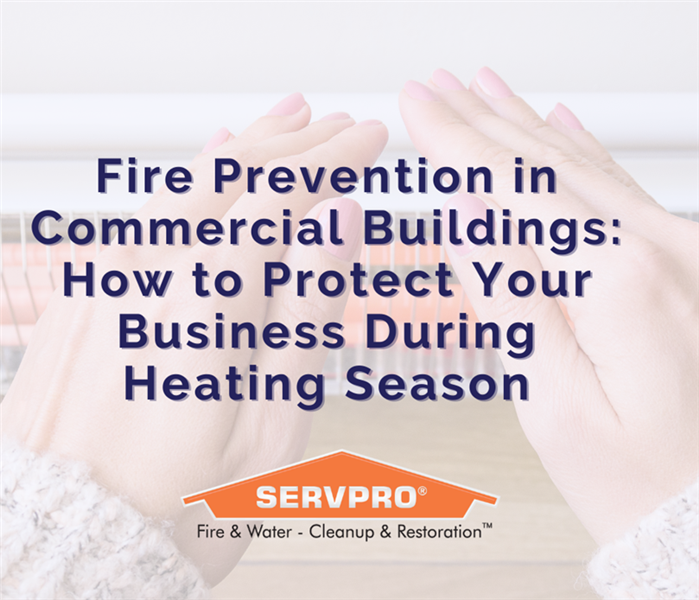Fire Prevention in Commercial Buildings: Safeguarding Your Business During Heating Season
11/6/2024 (Permalink)
As the temperatures drop and heating systems kick into gear, the risk of fire in commercial buildings rises considerably. From heating equipment and space heaters to electrical malfunctions, several factors contribute to increased fire hazards during the colder months. For business owners, taking preventive measures to protect property and employees is essential. Here, we’ll discuss the fire hazards associated with heating season and share actionable fire prevention tips to help you safeguard your business.Common Fire Hazards During Heating Season
Recognizing the typical fire risks associated with heating season can help you prepare your building. Here are some of the main culprits:
Heating Systems
Heating systems are crucial for maintaining comfort, but if not properly maintained, they can become fire hazards. Malfunctioning furnaces, boilers, or heat pumps can overheat or leak gas, posing a significant risk. Dust buildup on heating elements and clogged vents also contribute to fire risks.
Space Heaters
Space heaters provide convenient, localized heat but are responsible for many workplace fires each year. They can easily overheat, tip over, or ignite nearby flammable materials such as paper, curtains, or furniture if not used carefully.
Electrical Malfunctions
During heating season, increased demand on electrical systems raises the risk of electrical fires. Faulty wiring, overloaded circuits, and damaged cords can spark fires, particularly in older buildings with outdated electrical infrastructure.
Flammable Materials Near Heat Sources
Storing flammable items—like cleaning supplies, paper, or chemicals—too close to heating equipment, furnaces, or space heaters is a serious risk. Even a small spark can quickly ignite these materials, turning a minor incident into a major fire.
Fire Prevention Tips for Business Owners
Preventing fires requires a combination of regular maintenance, employee training, and adherence to safety protocols. These fire prevention tips can help you reduce fire risks during heating season:
1. Schedule Regular Heating System Inspections
Arrange for your building’s heating system to be inspected and serviced annually by a licensed HVAC professional. This helps ensure safe operation and efficient performance. During the inspection, the technician will check for issues such as gas leaks, faulty wiring, or clogged vents. Regular maintenance can prevent small issues from becoming major fire hazards.
- Clean Filters and Vents: Clogged filters can restrict airflow, causing the system to overheat. Regularly clean or replace filters to ensure proper airflow and reduce fire risks.
- Test Smoke and Carbon Monoxide Detectors: Make sure all detectors are functioning properly, especially those near heating equipment. These devices can provide early warning in case of a fire or gas leak.
2. Establish Space Heater Safety Guidelines
If space heaters are used, enforce clear safety rules:
- Use Certified Heaters: Ensure all space heaters are certified by reputable testing labs (like UL or ETL) and have automatic shut-off features.
- Keep Heaters Away from Flammable Items: Place space heaters at least three feet away from anything combustible, like paper or furniture.
- Turn Off When Unattended: Space heaters should be turned off when no one is present or at the end of the workday. Consider using heaters with timers to prevent accidental overnight use.
- Use Proper Outlets: Plug heaters directly into wall outlets, avoiding power strips or extension cords, which can overload circuits.
3. Conduct Electrical Safety Inspections
Increased electrical load during heating season requires that your building’s electrical systems are prepared:
- Inspect Outlets and Cords: Look for frayed cords, loose outlets, or signs of wear. Damaged cords should be replaced immediately, and cords should not run under carpets or across doorways where they may be damaged.
- Monitor Electrical Load: Ensure circuits aren’t overloaded. If in doubt, have an electrician perform a load test to ensure compliance with electrical codes.
- Install Ground Fault Circuit Interrupters (GFCIs): GFCIs help prevent shocks and fires, particularly in damp areas. Verify that GFCI outlets are installed in kitchens, bathrooms, and other vulnerable areas.
4. Create a Fire-Safe Workspace
Keep your workspace clear of potential fire hazards:
- Clear Combustible Clutter: Avoid storing flammable items near heating sources. Keep cleaning chemicals, paper, and boxes away from heaters, electrical outlets, and other heat sources.
- Designate a Smoking Area: If smoking is permitted, ensure there’s a designated outdoor smoking area with proper disposal containers for cigarettes.
- Ensure Fire Extinguishers Are Accessible: Place extinguishers in easy-to-reach locations, particularly near kitchens, mechanical rooms, and break areas. Train employees on how to use them properly.
5. Train Employees on Fire Safety
Consistent fire safety training ensures employees know how to prevent and respond to fires:
- Using Fire Extinguishers: Familiarize employees with the PASS method—Pull, Aim, Squeeze, Sweep—for fire extinguisher use.
- Evacuation Procedures: Establish and communicate an evacuation plan, including the location of exits and assembly points. Conduct regular fire drills to keep employees prepared.
- Reporting Hazards: Encourage employees to report fire hazards, such as damaged electrical cords or malfunctioning heaters, promptly.
As the heating season begins, fire prevention becomes even more critical. Proactive measures like regular heating inspections, enforcing space heater safety guidelines, electrical safety checks, and maintaining a fire-safe workspace can greatly reduce your risk. Fire prevention requires preparation, maintenance, and employee awareness—all essential for protecting your business from the potentially devastating effects of a fire.
If you need assistance with fire safety preparations this winter, our team of experts can help with fire risk assessments, inspections, and preventive maintenance. Contact us to learn how we can keep your business safe during the colder months.
As a trusted leader in the restoration industry, Norwood/West Roxbury has the advanced training and equipment to restore your property if needed. Call us today at (781) 769-9125.





 24/7 Emergency Service
24/7 Emergency Service
